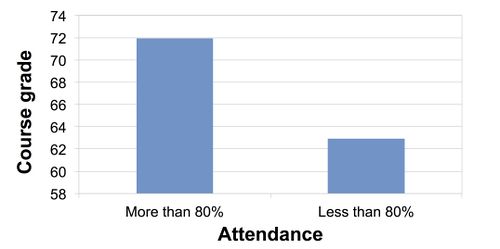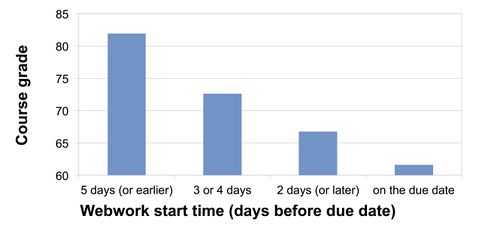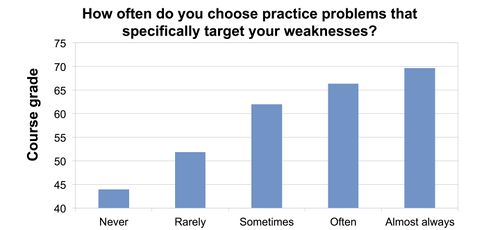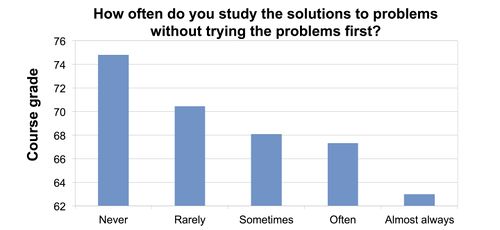UBC math study skills
This website will provide you with suggestions on how to improve your study skills in a first year math course at UBC.
- If you are just starting a university math course and would like to get off on the right foot, see the section on staying up to date in a course.
- If you would like advice on how to catch up once you've fallen behind, see the section on getting help and catching up.
- If you are looking for suggestions on studying methods in general, see the sections on webwork and using study time efficiently.
- If you are preparing for an upcoming exam, see the sections on using study time efficiently and preparing for an exam or quiz.
Contents |
Staying up to date with the course
Attending class
Attending class regularly is important for the following reasons:
- Learning the course content.
- Staying up to date with the flow of the course.
- Being aware of important course announcement.
- Connecting with classmates.
- Asking your professor questions.
As the term progresses and responsibilities add up, a common mistake is to skip class to meet deadlines for other courses, with the intention of catching up the material on your own time after the lecture. Often you may not find the time to catch up, and the result will be that you will have difficulty following the next lecture.
Based on data gathered in 2016, the average grade of Math 101 students who attend class more than 80% of the time is about 10% higher than that of students who attend class less than 80% of the time (see graph below).
Reviewing course notes
University mathematics lectures are very dense with information, so that you may not be able to understand everything during the lecture. It is strongly recommended that you spend some time after each lecture reviewing the course notes (or the corresponding section in the book). This will allow you to better understand the following lecture. Many students find it helpful to schedule a specific time when they will review their course notes. For example, if you have a one hour break either before or after your regular lecture time, this would be an ideal time to review your notes or textbook.
A common mistake when reviewing course notes/book is to read the notes/book, much the same way that one would read a novel. A much more effective way of reviewing is to try to do the examples that were done in class by yourself, without looking at the solutions first. Once you are stuck for a minute or two and no longer able to continue the example, look at the solution to see the next step in the example, and return to writing your own solution. Although this is more time consuming than reading, it will give you essential practice in using the techniques introduced in class (see also using study time efficiently).
Finding time for regular practice
One of the challenges of taking a university mathematics course is that in addition to doing the assigned homework, you are expected to regularly set aside several hours a week on additional practice problems.
A common mistake is to leave all of this extra practice until before a quiz or test. Instead, many students find it effective to set aside several times each week for doing this additional practice. If you use a calendar or planner to manage your time, now would be a good time to choose a time for this practice and make it part of your weekly routine. An ideal time would be one which doesn't conflict the due dates for your weekly assignments.
Getting help and catching up
Getting help
"I talked to a friend who was struggling as well, and decided to spend extra hours per week to properly prepare for quizzes. Since then, I did improve my marks and study habits." - former Math 101 student
If you've fallen behind in a first year math course, an important first step towards catching up would be to ask for help from someone. Do not suffer in silence.
There are many options available for getting help:
- If you have a lot of catching up to do in the course, you will want to construct a plan which will allow you to spend additional time catching up the content which is most relevant to the current section in the course. In this case, make an appointment with your professor to discuss such a plan of action. If you are reluctant to approach your professor, ask a classmate to help you figure out which previous sections the course are most important for understanding the current one.
- If you have fallen behind and you have a friend who is also struggling, consider working together and keeping each other accountable to doing additional practice.
- If you are finding that you have been putting in consistent effort in a course, but are still not getting the grade you would expect, consider spending more time with helpful classmates, going to the professor's office hours, and utilizing the Math Learning Centre (MLC). You may also want to see the sections on webwork and using study time efficiently below.
- Another option is to find a private tutor. The AMS tutoring website has free group tutoring and a list of private tutors that charge a rate per hour.
If you're finding that you're overwhelmed by everything you have to do academically, or are going through personal difficulties, it is important that you talk to a counsellor, an academic advisor, or one of the other groups on campus that support students. Every year there are a number of students who will experience such difficulties, and reaching out for help is nothing to be ashamed about. Here are some important links:
Formulating a plan
In order to catch up in a course, you will want to formulate a plan. If you are working with a friend who is also struggling, decide together on this plan and hold each other accountable to it.
Ideally, your plan should include:
- Specific times when you will work with classmates or at the MLC.
- Additional time devoted to practice problems, done regularly (also see staying up to date in a course).
- Time devoted to catching up the topics most relevant for understanding the current section of the course.
If you need to catch up several sections of the course to understand the current one, make an appointment with your instructor or talk to a classmate, and ask them which sections are most relevant to the current one. This will allow you to focus on catching up the content which is essential for learning the current section.
If you are having difficulty formulating or following through on a plan, consider seeing Science Peer Academic Coaches.
Webwork
Starting early
By starting Webwork several days before it is due, you will allow yourself time to think about the problems and seek help when needed. See the section getting help below.
In Math 101 in 2016, students who started Webwork assignments 5 days ahead of time or more had an average course grade which was about 15% higher than the students who started Webwork assignments 2 days before the due date or later (see graph below).
Getting help
If you find that you would like help in completing webwork assignments, there are many resources available to you:
- The MLC is open from Mon-Fri 12-5pm on most weeks (check the schedule for any updates).
- If you would like to work with classmates but don't know anyone in the course, see if you can connect with others working on the same course at a table in the MLC (tables will sometimes be marked with a course number).
- Your instructor will have office hours set aside. If you prepare specific questions about the homework, the instructor will be happy to help you with them.
- Your course will most likely have a Piazza forum that you can use to ask questions about the homework (if that question has not already been posted).
- You can also have a look at the Facebook page for your course and use it to find or organize a study group. Note that these Facebook pages are not officially supported by UBC.
Regardless of where you seek help, starting early will make it easier to receive help and make the most of that help (see starting early above).
If you are planning to work with classmates and want to use the time efficiently, see the section on working in groups below.
Writing up solutions
It is recommended that you to keep your work organized in a notebook while doing your Webwork assignments. This will allow you to
- find algebra or other mistakes quickly in cases where you do not get the question correctly on the first attempt.
- show your work to classmates, a TA or the instructor when you ask for help.
- practice writing solutions in a way that a grader can read (important for part marks on exams).
- practice explaining your reasoning, which will help solidify the concepts and techniques in your mind.
Using study time efficiently
"I noticed that I was spending too much time reading the textbook and not enough time doing practice problems." - Former Math 180 student
Evaluating your study habits
"I found that I became so easily distracted when I was having difficulty with a concept. I would give up early on and just get on social media and browse the internet. I had to change this by getting help as soon as I could, and removing all distractions from the room." - former Math 101 student
If you are concerned that you are not using your study time efficiently, consider the following questions:
- Do you tend to get distracted when studying? Consider removing the distractions from your study environment, and having only pen/pencil and papers.
- Do you stay stuck for a very long time on a single problem or concept? Consider writing down your questions, and bringing the questions to a classmate, the professor or the MLC.
- Do you find that you spend a lot of time reading the textbook or notes, and little time solving problems? Consider treating the examples in the textbook or notes as practice problems, only looking at the solution to the example once you are stuck. See using practice problems below.
Choosing practice problems
There are many sources of problems and examples that you can choose from, including:
- The textbook examples and problems.
- Examples from the course/lecture notes.
- Problems from old exams (see the old exams wiki).
- Webwork assignments.
With so many problems to choose from, you may be wondering how to decide which problems to work on. After mastering the basic lecture and homework problems, look at the relevant section of either the old exams wiki or the recommended problems in your textbook, and try to identify those problems that you already know how to do, and those problems that you do not yet know how to do. This will allow you to target gaps in your problem solving abilities. Try to group problems according to the techniques or concepts needed, and target at least one problem from each group.
From data gathered on Math 180 in 2016, students who choose problems that target their weaknesses tend to do better in the course (see graph below).
Using practice problems
When doing practice, it is important that you be active in trying to solve the problems without looking at the solutions, as much as possible. Once you are stuck on a problem for a couple of minutes, look at the solution to see the next step, and return to writing your own solution to the problem. Spending large quantities of time reading the solutions to problems and examples is usually associated with a lower grade in the course (see graph below; data from Math 101 in 2016).
Another common mistake when studying is to spend a lot of time solving problems, but little time reflecting on the concepts and techniques that you used to solve the problem. After you solve the problem, try to explain to yourself how you solved the problem, and why you chose that method.
Working in groups
Working with friends and classmates can be a powerful way to stay motivated and learn from each other. This is especially the case if you are behind and need some extra help catching up (see getting help and catching up). However, in order for the time you spend in groups to be used efficiently, avoid the following common mistakes:
- Getting off topic.
- Not trying the problems yourself before asking a friend for help.
- Spending all of your time helping someone and not doing your own work.
- Giving answers to your friends instead of giving them hints or explanations.
- Working in groups that are too large.
If you are finding that group work is unproductive, don't hesitate to shift the balance towards working individually. Everyone has to find the balance that works for them. No matter how effective group work is, you should always spend some time working individually and reproducing exam conditions (see preparing for an exam or quiz).
In order to make the most of group work, you and your group members should spend time explaining how you solved problems to each other. This will help solidify the techniques and concepts in your mind.
Preparing for an exam or quiz
After you have worked through the example problems from lectures and have done some additional practice problems, the next step is to prepare for the upcoming exam or quiz. The key to your preparation is to simulate the exam experience as much as possible. This means that when preparing for an exam or quiz, you should work under the following conditions:
- No books, notes or other aids (unless these are allowed your test).
- No outside distractions (put away your computer).
- No calculator (unless they are allowed on your test).
- A realistic time limit for when you should complete the problems.
Working without your notes/books will quickly help you realize which formulas and concepts you still need to learn. Every time you encounter a difficulty remembering or applying a formula or concept, add it to a formula sheet. Review this formula sheet periodically until you have memorized and understood everything on it.
To determine a realistic time limit for solving a set of problems, look at the pdf file of the old exam, and determine how many marks was allotted to that question. By dividing that number of marks by the total number of marks on the exam, you can find out what time should be spent on that question (relative to the length of the exam).
Make sure that you solve a diverse set of problems in succession and without interruptions, as you would be required to do on an exam. This will give you practice budgeting your time among different problems.
The night before the exam or quiz, it is often tempting to stay up late in order to do more practice problems. At that point, however, the benefit of getting more sleep far outweighs any benefit from extra practice, and it is better to go to bed sooner than later. The wellness centre at UBC is a great place to drop by if you would like advice on getting enough sleep and staying healthy.



